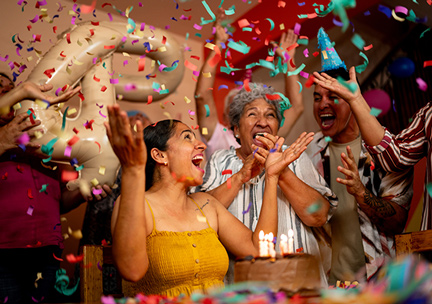Mary’s Story: From Diagnosis to Advocacy

In June 2018, Mary went in for her annual wellness visit.
The physician assistant found something unusual during the exam.
“She found what she thought was a lump,” Mary said. “I already had a mammogram scheduled, but she changed it to a diagnostic mammogram.”
A diagnostic mammogram is more detailed than a regular screening.
Instead of simply taking images to review later, a radiologist reads the images immediately and can recommend further steps on the spot.
“They did the diagnostic mammogram, and then they said I needed an ultrasound,” Mary said. “And after that, they said I needed a biopsy.”
The biopsy confirmed the diagnosis: Stage 1 breast cancer.
Facing the Diagnosis with Strength and Determination
When she learned about her diagnosis, Mary said she cried. She called her husband to tell him the news.
“My husband said he would come home from work, but I told him no,” Mary said. “I told him, ‘This is a normal day. It’s not going to take over our lives.’”
Just a few years before Mary's diagnosis, her sister had undergone breast cancer treatment, choosing a bilateral mastectomy. Mary traveled to Texas to care for her, witnessing firsthand the challenges of breast cancer treatment.
After taking care of my sister, she decided that if I ever got cancer, she was going to do the same.
“So when I sat down with my surgeon, I told him, ‘You don’t even have to waste your breath — I’m having a mastectomy.’”
The surgeon supported her decision without hesitation. He performed the mastectomy in August 2018.
Chemotherapy and the Challenges of Recovery
After the surgery, doctors sent Mary’s tumor to pathology for further testing. Her oncologist, Neelima Chintapalli, MD, waited for comprehensive test results, including the Onca test, before determining that Mary would need chemotherapy. With her Onca test score at 27 (just above the 25 threshold), chemotherapy was recommended.
Mary went through four rounds of chemotherapy starting in September 2018. The treatments were difficult — causing fatigue, mouth sores, joint pain, and even hair loss.
“I had my last round of chemo in early December. My birthday is December 9, and I spent it in bed, but I was back at work by January,” Mary said.
Returning to her job as a fifth-grade teacher wasn’t easy. Mary’s colleagues stepped in to help, offering to cover her recess and lunch duties so she could rest.
“They even made little coupons for me that I could use to ask for help,” Mary said.
Finding Strength in Support and Giving Back
Mary’s experience taught her the value of a strong support system and the importance of helping others facing similar challenges.
After retiring in 2021, Mary decided to become a volunteer at CHRISTUS Health’s cancer treatment center and breast care center in Shreveport.
“I remember what it felt like when a volunteer asked me if I needed anything,” Mary said. “I thought, ‘That’s for me? Are you sure?’ It meant so much to me at the time.”
Now, Mary spends her Mondays making care packages for women newly diagnosed with breast cancer. She also delivers snacks and milkshakes to patients undergoing chemotherapy.
“It feels good to know I’m helping someone else feel better, even if it’s just with a milkshake,” Mary said.
She also encourages other women to speak up about their health and ask for what they need.
“Women don’t always know that they have options,” Mary said. “If you don’t feel comfortable with your doctor, you can change doctors. If you want a mastectomy instead of a lumpectomy, you have the right to make that decision.”
The Importance of Early Detection
Mary believes early detection is critical to her survival and recovery.
“This is literally five minutes of your life that can save your life,” Mary said, encouraging women to get yearly mammograms.
She also emphasizes that mammograms follow a structured and thorough process, even if the experience feels routine.
“It’s not random or unreliable,” Mary said. “If they find something, they follow up immediately. The radiologist reads it while you’re there, and they know what steps to take next.”
Mary understands that fear keeps many women from scheduling their mammograms — but she wants them to know it’s worth it.
“I know some women say it hurts — but not going because you think it might hurt is not a good reason,” Mary said. “It’s five minutes. You can do it.”
A New Perspective on Life
Mary’s experience changed her outlook on life.
“I tell women going through it — this doesn’t define who you are,” Mary said. “Yes, it’s part of your life now, but it’s not your whole life.”
Mary now focuses on living life with gratitude and helping others do the same.
“You might not be the same person after breast cancer,” she said, “but that’s not a bad thing. You come out stronger. And when you get to the other side, you’ll want to help someone else get through it, too.”
Take the Next Step in Your Health Journey
Breast cancer is highly treatable when caught early. If you’ve been putting off your mammogram, don’t wait. Early detection could save your life — and CHRISTUS Health is here to provide expert, compassionate care every step of the way. Schedule your mammogram today.
Request a mammogram or complete a breast cancer questionnaire to receive a report with your breast cancer risk factors and tips on reducing those risks.



